Choosing an assisted living community for your loved one is one of the most important decisions you’ll make. You want them to feel safe, supported, and truly at home. But with so many communities to choose from, it’s not always easy to know where to begin.
Whether your loved one needs more help with daily tasks or simply wants a more engaging and maintenance-free lifestyle, the right assisted living community can offer comfort, connection, and peace of mind. Here’s what to look for when evaluating your options.
Signs it might be time for assisted living
It’s common for families to hesitate before making a move, even when their loved one is struggling. But assisted living can often improve quality of life—not just maintain it. Here are a few signs that it may be time:
- Difficulty managing medications or missing doses: If your loved one forgets to take medications—or accidentally takes too much—it could lead to serious health consequences.
- Falls, accidents, or safety concerns at home: Frequent bruises, unexplained injuries, or increasing trips and stumbles are signs their current environment may no longer be safe.
- Noticeable weight loss or poor nutrition: Losing interest in cooking or forgetting to eat can result in unintentional weight loss or malnutrition, impacting overall health.
- Isolation or signs of depression: If your loved one no longer attends social gatherings, avoids phone calls, or seems down more often than not, assisted living could provide much-needed connection.
- Increasing reliance on family members for daily tasks: Caregiver burnout is real. If you’re stepping in more and more to help with bathing, dressing, or meals, it’s time to reassess their care needs.
Other less obvious signs include unopened mail piling up, laundry or dishes being neglected, or difficulty keeping up with hygiene. These daily disruptions can erode confidence and independence, and may indicate that more structured support would be beneficial.
If you’re seeing any of these signs, it might be time to explore options. Assisted living can offer the right balance of support and independence, while also easing the emotional and physical strain on family caregivers.
What to look for in a high-quality assisted living community
When searching for an assisted living community, it’s essential to focus on the services, amenities, and overall environment that best meet the needs of your loved one. Here’s what to look for.
1. A warm, welcoming atmosphere
First impressions matter. When you visit a community, take note of how it feels. Does it seem cheerful, clean, and comfortable? Are residents smiling and interacting with staff? Look for signs that people feel at home.
A welcoming environment includes more than just cozy furniture and fresh flowers. Listen for laughter, observe how staff speak to residents, and pay attention to whether the atmosphere feels peaceful or rushed. Does the lobby feel like a hotel or a home?
You’ll want a place where your loved one can make genuine connections and feel part of a community—not just live in a building. Bonus if the common areas feel active and inviting, with plenty of comfortable seating and natural light.
2. Personalized care that respects independence
Great assisted living doesn’t just provide support—it empowers residents to stay as independent as possible. That starts with personalized care plans tailored to each individual’s needs.
Ask how the staff evaluates residents’ abilities, and how often care plans are updated. Can they help with bathing, dressing, or medication reminders and step back when help isn’t needed? The best communities strike that balance.
It’s also helpful to know whether residents are encouraged to set goals or participate in planning their daily routines. Personalized care should support a resident’s strengths while gently offering help when it’s needed most. A flexible approach allows your loved one to grow with confidence.
3. Highly trained and compassionate staff
Caring for seniors takes more than training—it takes heart. Observe how team members interact with residents. Do they know people by name? Are they patient and engaged?
Ask about staff-to-resident ratios, caregiver training programs, and how the community ensures consistent, high-quality care. Longevity of staff is also a good sign.
It’s also worth asking how staff handle difficult behaviors, communicate with families, and resolve concerns. Communities with strong leadership and open-door policies tend to have more cohesive, happier teams, which shows in the care residents receive daily.
4. Nutritious meals that feel like home
Mealtimes are a big part of daily life. A high-quality assisted living community will offer healthy, well-balanced meals, and residents can choose from several options.
Look for communities that:
- Offer three meals a day plus snacks
- Can accommodate dietary restrictions
- Involve residents in meal planning or feedback
- Make dining a social, enjoyable experience
Ask to see a sample menu or observe a meal in progress. Does the dining room feel lively and comfortable? Are residents engaged with one another? A good dining experience is about nourishment and connection.
5. Engaging activities and social opportunities
Isolation can be a major concern for older adults. That’s why assisted living should include more than just care—it should offer opportunities for connection and purpose.
Check the activity calendar for:
- Games and hobby groups
- Fitness or movement classes
- Religious services or holiday celebrations
- Outings to local attractions
The right mix of offerings helps residents stay active and emotionally fulfilled.
6. A safe, accessible environment
Safety is essential. Look for features like:
- Handrails and grab bars
- Wide, well-lit hallways
- Non-slip flooring
- Secure entrances
Ask how the community handles emergency situations, and whether staff is available around the clock. Peace of mind starts with preparation.
7. Transparent pricing and flexible options
Understanding the cost of assisted living is key. Look for transparency—what’s included in the monthly rate? What services cost extra?
Ask about:
- Upfront fees or deposits
- Month-to-month vs long-term contracts
- What happens if care needs change
A quality community will help you understand your options without pressure.
8. Family involvement and communication
Your role doesn’t end once your loved one moves in. A great community welcomes families and keeps them informed.
Ask how often families receive updates, whether there are regular care meetings, and how the staff handles concerns. Look for a culture that values collaboration.
9. A strong local reputation
Sometimes the best insights come from other families. Ask around in the Northville area or check online reviews. Look for consistency in what people say about staff, care, cleanliness, and leadership.
You can also ask the community to connect you with current residents or families who are willing to share their experience.
10. A true sense of belonging
Ultimately, you want your loved one to feel like they belong. That sense of purpose and connection matters just as much as physical care.
Communities that encourage friendships, promote individuality, and foster shared experiences help residents feel valued. Ask if there are welcome programs for new residents, opportunities for leadership within the community, or clubs and committees that give people a voice. Even small details—like staff remembering a resident’s birthday or favorite hobby—can make a big difference.
Creating a community that feels like home requires attention to these personal touches, paving the way for deeper discussions about fostering meaningful connections.
Questions to ask during a tour
Visiting a community in person gives you a chance to observe the environment, ask questions, and picture your loved one living there. Bring a list of questions with you so you don’t forget anything important. Consider asking:
- How is the care plan created and updated?
- What happens if a resident’s needs change?
- Can residents bring their own furniture and décor?
- Are pets allowed?
- What’s the dining experience like?
- How are medical needs monitored and managed?
- Is transportation provided for appointments or outings?
Don’t be afraid to ask follow-up questions or request a second tour if needed. A good community will welcome your curiosity and be transparent with its answers.
Why families choose Cedarbrook of Northville
At Cedarbrook of Northville, we know how much this decision matters. That’s why we’ve built a community where older adults feel supported, respected, and truly at home—not just cared for, but cared about.
- Our team provides personalized care that adapts to changing needs, ensuring that every resident receives support that evolves with them.
- We offer chef-prepared meals crafted for both nutrition and enjoyment, served in a welcoming dining room that fosters connection.
- Residents can engage in vibrant activities that nourish the mind, body, and spirit—whether through creative arts, group fitness, or meaningful conversations on the patio.
- Our beautiful indoor and outdoor spaces are designed for comfort, mobility, and peace, with garden paths, sunny lounges, and quiet reading nooks.
- Families are kept involved and informed through regular communication, care conferences, and family-focused events that make them feel like part of the Cedarbrook community.
We’re also deeply rooted in the Northville area and take pride in being part of this vibrant community. Our connections with local resources, healthcare providers, and volunteers enrich daily life for residents and make Cedarbrook of Northville feel like home in every sense.
We understand that this is more than a move—it’s a transition filled with emotions, questions, and hopes for the future. Our team is here to listen, support, and walk with you through every step of the journey, from the first conversation to move-in day and beyond.
Let’s talk about what’s next for you and your loved one
If you think assisted living might be right for your loved one, don’t wait to learn more. You don’t have to make this decision alone. At Cedarbrook of Northville, we’re here to help you explore your options with care and clarity. Whether you’re just beginning to research or you’re ready to visit in person, we’re happy to answer your questions and support your journey. No pressure—just honest, compassionate guidance.
Reach out to our team today to schedule a tour, speak with a care advisor, or learn more about what daily life is like at our community. We’re here to support you—every step of the way. Call 734.865.2765 or connect with us online.







